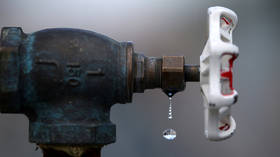First German city introduces cold public showers

The German city of Hannover has taken some drastic measures in an attempt to reduce energy consumption as the nation is bracing for a looming energy crisis. The city authorities have cut off hot water in public buildings and reduced their maximum heating temperatures as part of their energy-saving campaign.
Hannover authorities gave the city’s sports enthusiasts the cold shower – quite literally – on Monday when they announced hot water would be switched off in all of the city’s public buildings, including sports halls, gyms, and pools from now on. Public employees will also have to wash their hands with cold water while at work under the new regulations.
The city’s residents will also have to brace for colder temperatures while indoors. Under the new rules, the maximum room temperature in public buildings, including day-care centers, is limited to 20 degrees Celsius. In sports halls and gyms, it cannot exceed 15 degrees Celsius – a list of regulations published on the official city website says.
The upcoming winter heating period for municipal buildings has also been set for between October 1, 2022 to March 31, 2023. “Outside of the period, heating is generally no longer provided,” the authorities warned. Other measures included shutting down public fountains and external lights for the town hall, city museums, and other public buildings.
The measures were taken as the city launched a campaign to reduce energy consumption by 15% to prepare for potential supply bottlenecks in winter. The city authorities said they wanted to prepare in advance instead of just reacting to a situation, when there was no longer enough gas for everyone.
“We have to get ahead of the situation,” the city’s Finance and Regulatory Affairs Officer Axel von der Ohe said. Meanwhile, Mayor of Hannover Belit Onay told journalists on Wednesday that “every kilowatt hour saved protects the gas storage facilities.”
Hannover is not the only German city to take some protective measures ahead of winter. The city of Dusseldorf plans to reduce heating temperatures for autumn and winter to save energy, according to the German tabloid Bild.
Earlier in July, German media outlets also reported that Germans had reduced their shower time amid the repeated government austerity calls. German Economy Minister and Vice Chancellor Robert Habeck has previously called for people to cut back on their heating, sauna visits, and showers to help the country reduce its dependence on Russian energy.
Germany has been bracing for an energy crisis as the EU attempts to reduce the bloc’s reliance on Russian energy amid a standoff over Moscow’s military action in Ukraine. Gas prices have nearly quadrupled this year, primarily due to a shrinking flow from Russia, the continent’s major supplier.













